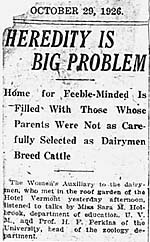

 American eugenics organizations, such as the Eugenics Record Office and
the American Eugenics Society, depended on local and state societies to implement campaigns
to arouse support for eugenic reforms. The Eugenics Survey of Vermont assumed this role, as
Professor Perkins publicized their studies and promoted eugenic legislation through Annual
Reports, press releases in Vermont newspapers, and lectures to civic, professional, and
church groups. As the leading spokesman for eugenics in Vermont, Perkins lobbied the state
legislature in 1927 and 1931 to enact a sterilization law and expand programs for
segregation of the "feebleminded." In his speeches and publications, Perkins
appealed to state, town, and family pride one hand, and to local prejudice, fear, and
economic worries on the other, in order to foster an appreciation for "blood and
breeding" among Vermonters.
American eugenics organizations, such as the Eugenics Record Office and
the American Eugenics Society, depended on local and state societies to implement campaigns
to arouse support for eugenic reforms. The Eugenics Survey of Vermont assumed this role, as
Professor Perkins publicized their studies and promoted eugenic legislation through Annual
Reports, press releases in Vermont newspapers, and lectures to civic, professional, and
church groups. As the leading spokesman for eugenics in Vermont, Perkins lobbied the state
legislature in 1927 and 1931 to enact a sterilization law and expand programs for
segregation of the "feebleminded." In his speeches and publications, Perkins
appealed to state, town, and family pride one hand, and to local prejudice, fear, and
economic worries on the other, in order to foster an appreciation for "blood and
breeding" among Vermonters.
Concern over the state's reputation as backward in the 1920s gave way to an apparent sense of triumph in the 1930s with the Survey's accomplishments in providing the state with a comprehensive social and eugenic program for Vermont's future. During the 1930s, the Eugenics Survey spearheaded a state-wide educational campaign using Rural Vermont: A Program for the Future as the vehicle for eugenics education in Vermont communities. Through the Vermont Federation of Women's Clubs and interested community leaders, the Eugenics Survey sponsored community round tables and book discussion groups and provided eugenics literature to libraries around the state. While "fitter family" contests were used to popularize eugenics at state fairs in the Midwest, Perkins apparently preferred to advance eugenics through philanthropic ventures, community development initiatives, and social welfare programs.
Professor Perkins publicized the accomplishments of the Eugenics Survey and the Vermont Commission on Country Life to national audiences. As President of the American Eugenics Society (1931-1934), Perkins sought to restore Vermont's reputation as a progressive state whose eugenically cultivated native stock would reemerge as a hardy race with the same innate vigor, spirit of self-sufficiency, and leadership of the early pioneers:
The quixotic dream of five years ago has already been realized in considerable part and a splendid beginning has been made towards speeding up the best sort of progress built upon the fine traditions of the old state. . . Eugenics in Vermont, then has already accomplished something. . .first by giving a clearer conception of those elements in the environment which may hinder or help human betterment and second by setting in motion the means of improving the good elements and lessening the bad.
All this may conceivably eventuate in bringing about in Vermonters an attitude of greater respect for the finest traditions of the state and for the best qualities in her native stock, a greater determination... to "raise the standards of civilization" in the country places, and in this better setting, to rear a finer race, with fewer defectives and reasonably large families of children, sturdy in body and healthy in mind.
Henry F. Perkins,
"Contributory Factors in a Rural State," 1932